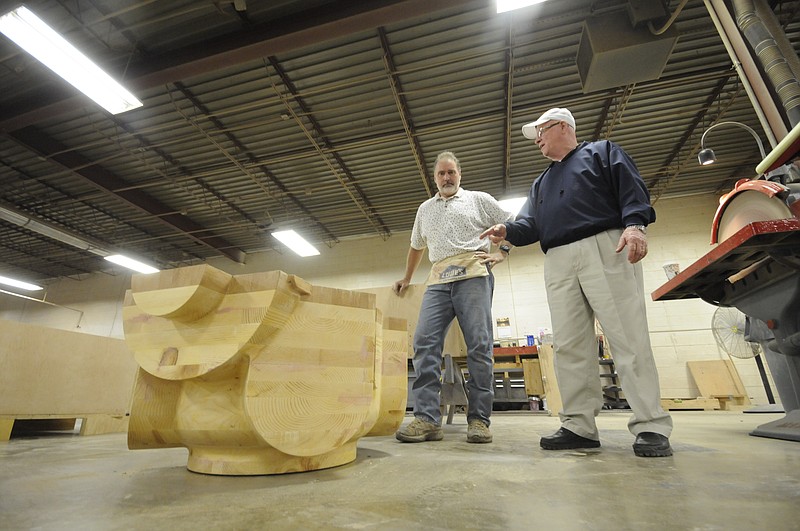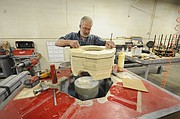In 1959, Bill Smith was an apprentice learning how to build the wooden patterns that foundries use to crank out everything from cast-iron cornbread skillets to the steel wheels on U.S. Army tanks.
That was when foundries played an oversized role in Chattanooga's industrial scene.
The molten metal that flowed through the hulking buildings helped earn Chattanooga its "Dynamo of Dixie" nickname. Wheland Foundry, for example, employed some 2,000 workers and produced parts found in more than half of U.S. autos.
Foundry smoke also contributed to Chattanooga's notoriety on Walter Cronkite's nightly network TV newscast as having the nation's worst air quality.
Foundries rely on patterns - usually made from hardwood such as alder, sugar pine and mahogany but also metal and hard plastic - that are models for the metal parts they make.
A foundry pattern is placed inside a wooden box, and then it's packed inside special casting sand that hardens as its dries. That makes the sand mold into which molten metal is poured at the foundry to make the part.
During the heyday, there were 10 to 15 shops in Chattanooga, Smith said, that made wooden patterns for foundries.
"Our market used to be right here in Chattanooga. You didn't have to go out the door. They'd come to you," he said.
Now, Smith's Foundry Pattern Service, Inc., at 1248 E. 38th St. near Rossville Boulevard is one of the last of its kind in Chattanooga.
It was founded in 1959 and purchased in 1988 by Smith and his father, Ben Smith.
Only one or two other pattern-making shops still exist in the Chattanooga area, said Bobby Green, the pattern supervisor at Smith's shop.
"Everyone used to know what pattern making was," Green said. "People think you make dresses, or something, now."
While other foundry pattern businesses have folded, Smith says he's here to stay.
"This business is not a dying breed," Smith said. "They'll always have to have us."
Have to 'see in 3-D'
Making foundry patterns is a tricky skill that years to master.
Pattern makers get a blueprint that they have to turn into a three-dimensional wooden shape that's a model for the metal part.
"We build everything with our hands from a blueprint," Smith said. "You gotta be able to see 3-D."
But wooden pattern isn't an exact replica of the metal part. It may be sloped, because the pattern maker has to account for such things as the way the sand mold will separate from the pattern. Other considerations include the shrinkage of the molten metal and how the metal will flow into the mold.
Figuring out how to make a pattern can keep you up at night, Green said.
"You'll have a job sometimes, you'll lay awake at night, and [the solution] would come to you in the middle of the night," he said.
Bill Smith thought about becoming a teacher, but then he decided to try pattern-making like his father, Ben Smith, whose work included making patterns for Lodge Cast Iron in South Pittsburg, Tenn., such as a cornbread skillet and Dutch oven.
"He was one of the best pattern-makers there ever was," Green said of Ben Smith.
Technology speeds pattern making
The pattern making trade has evolved over time.
Workers at Foundry Pattern Service used to do everything by hand on lathes and other machinery that now mainly stands idle in the 60,000-square-foot space that Smith moved into after his 12,000-square-foot space burned down in 2011.
Technology has made pattern-making faster. Computer-controlled routers can do in a few hours what used to take days.
About five years ago, Smith bought CNC (Computer Numeric Control) machines that allow fewer employees to maintain the same output. He's downsized his workforce from 18 employees to nine.
"We're mean and lean as they say," Smith said.
Travels cross-country to customers
Hitting the road helped Smith kept his business going while others faded away.
"We got out and toured the country," he said.
He's got customers in Iowa, Texas, Mississippi, North Carolina and Texas. Smith's shop makes patterns that get in parts for military vehicles, oil pipelines and water pipelines, among other uses.
Smith - who won't fly - has logged around 2 million miles driving to visit, often in a "dually" pickup truck that he uses to haul his business's wooden foundry patterns that can weigh hundreds of pounds and be the size of a Dumpster.
"That's the territory I have to cover to keep the work flowing," said Smith, who grew up the Tyner area of Chattanooga and now lives on Dayton Mountain with his wife Vivian, who's a front-office secretary at the shop.
Smith strives to treat his employees well. A foundry pattern maker can earn around $30 to $35 an hour - which is roughly $60,000 to $70,000 a year.
"I pay 100 percent on health, vision and dental. You want to keep your key people," said Smith, who's rebuffed advice from insurance people to do a 50/50 or 65/35 split in employees' healthcare expenses.
"No. I'm not taking money out of these guys' pockets," he said.
Foundry Pattern Service's youngest employee is Matt Compston, 21, an apprentice pattern maker whose father, Steve Compston, has worked for years at the shop.
"Young people that know how to work with their hands, it's a good trade to get into," Smith said. "It's been a wonderful career for me. I still love the work."
Contact staff writer Tim Omarzu at tomarzu@timesfreepress.com or www.facebook.com/MeetsForBusiness or on Twitter @meetforbusiness or 423-757-6651.

